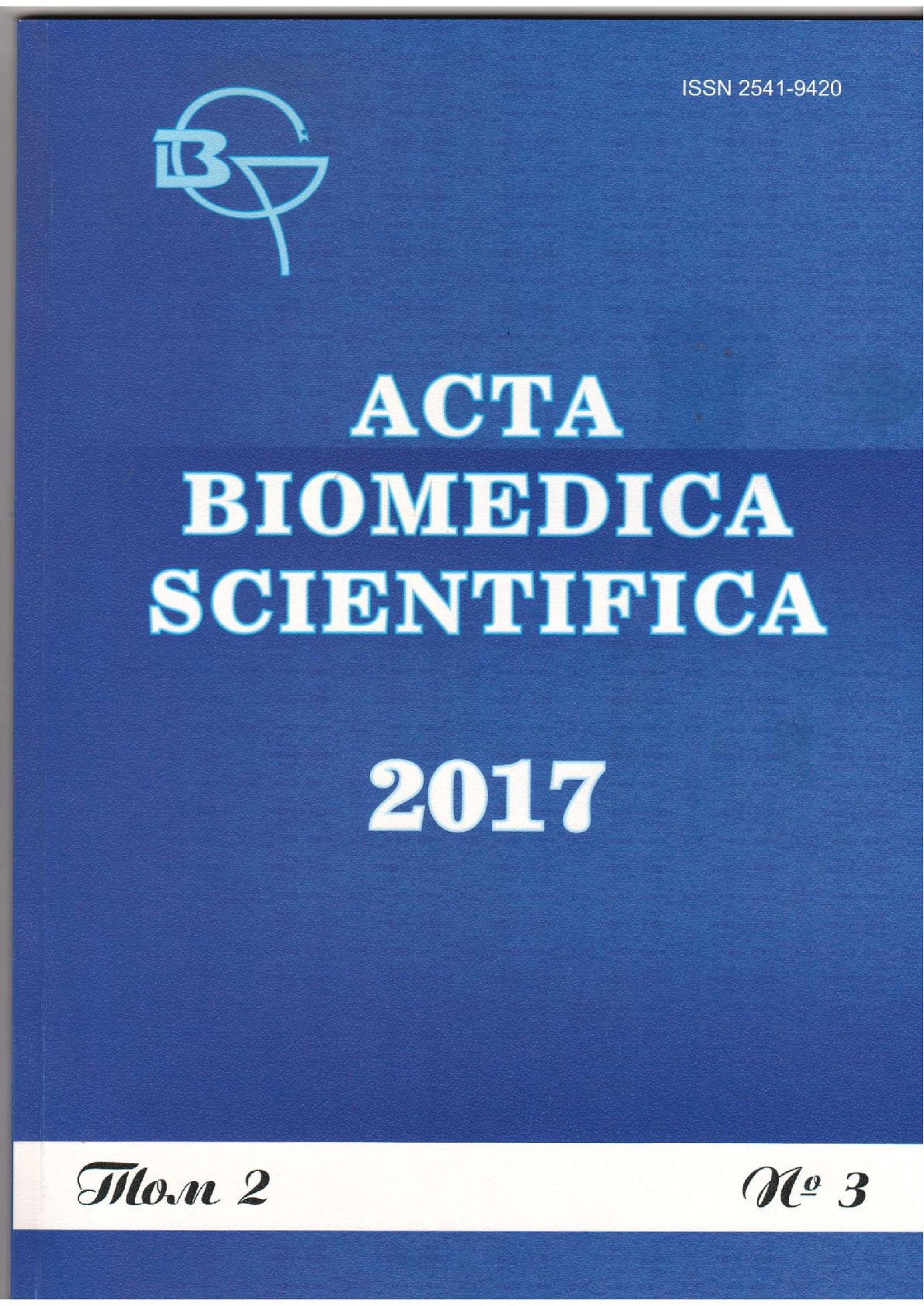Irkutsk, Irkutsk region, Russian Federation
Irkutsk, Irkutsk region, Russian Federation
Irkutsk, Irkutsk region, Russian Federation
The problem of overweight and obesity is one of the most urgent health issues in the world. 13% of girls and 21% of boys aged 11 suffer from overweight in the Russian Federation.The main causes of pubertal obesity are endocrine pathology, lifestyle and genetic disorders including mutation and polymorphisms of different metabolic pathways. Leptin produced in adipose tissue participates in reproduction regula-tion, glucose homeostasis, bone formation, etc. These effects are provided by leptin receptors coding LEPR gene. Q223R (rs1137101) polymorphism is associated with an increased serum level of leptin and overweight. There is no exact information about association between this polymorphism and obesity of adolescent females. The objective was to reveal LEPR Q223R polymorphism association between overweight and obesity in adolescent females.123 Caucasian adolescent females were involved in this study. All samples could be separated into two groups: the girls with normal weight (SDS BMI ±1.0; controlgroup), girls with overweight and obesity (SDS BMI≥ +1.0–2.0; studied group). Anthropometric measurements (weight, height, waist and hip circumference, body fat percentage) were taken, and genotyping was performed using polymerase chain reaction with electrophoresis detection.G-allele frequency was 43.1% in control and 40% in the clinical group. We found no significant differences of the prev-alence of polymorphism Q223Rbetween the studied groups (р=0,862). Furthermore, there was no association between the carriage of AG and GG with weight, BMI, body fat percentage, waist and hip circumference in both groups (р> 0.05).We have not found any association between LEPR Q223R and overweight and obesity in adolescent females.
adolescent females, overweight, obesity, LEPR Q223R
1. AmetovAS (2009). Selected lectures in endocrinology [Izbrannyie lektsii po endokrinologii], 496.
2. AhmedovaRM, SofronovaLV (2012). Obesity and the metabolic syndrome in childhood: the modern approach to the problem [Ozhirenie i metabolicheskiy sindrom v detskom vozraste: sovremennyy vzglyad na problemu]. Voprosy diagnostiki v pediatrii, 4(1), 13-19.
3. KovalevaVY (2014). Role of obesity in the devel-opment of menstrual and reproductive functions [Rol’ ozhireniya v razvitii narusheniy menstrual’noy i reproduk-tivnoy funktsiy]. Rossiyskiy vestnik akushera-ginekologa,(2), 43-51.
4. Nikolaev IV, MulyukovaRV, KayumovaLR, Vorobje-vaEV (2014). Analysis of the interaction of alleles of genes of lipid metabolism in dyslipidemia [Analiz vzaimodey-stviya alleley genov lipidnogo obmena pri dislipidemii]. Vavilovskiy zhurnal genetiki i selektsii, 18(4/2), 856-866.
5. ScherbakovaMY, Poryadina GI (2012). Modern ap-proach to the problem of obesity in children and adoles-cents [Sovremennyy vzglyad na problemu ozhireniya u detey i podrostkov]. Pediatriya, 91(3), 122-130
6. Allele frequency for polymorphic site: rs1137101. The allele frequency database. Available at: https://alfred.med.yale.edu/alfred/SiteTable1A_working.asp?si-teuid=SI096978N.
7. BenderN, Allemann N, MarekD, VollenweiderP, WaeberG, MooserV, EggerM, BochudM (2011). Associa-tion between LEPR and Obesity Association between vari-ants of the Leptin Receptor Gene (LEPR) and overweight: a systematic review and an analysis of the CoLaus study. Plos One, 6 (10), e26157.
8. BoumaizaI, OmezzineA, RejebJ, RebhiL, Ouedra-niA, RejebNB, NabliN, AbdelazizAB, BouslamaA (2012). Relationship between Leptin G2548A and leptin receptor Q223R gene polymorphisms and obesity and metabolic syndrome risk in Tunisian volunteers. Genetic Testing and Molecular Biomarkers, 16(7), 726-733.
9. ConstantinA, Costache G, SimaAV, GlavceCS, Vlad-icaM (2010). Leptin G-2548A and leptin receptor Q223R gene polymorphisms are not associated with obesity in Romanian subjects. Biochem Biophys Res Commun, (391), 282-286
10. Domínguez-ReyesT, Astudillo-LópezCC, Salga-do-GoytiaL, Muñoz-ValleJF, Salgado-Bernabé1AB, Guz-mán-GuzmánIP, Castro-AlarcónN, Moreno-GodínezME, Parra-RojasI (2015). Interaction of dietary fat intake with APOA2, APOA5 and LEPR polymorphisms and its rela-tionship with obesity and dyslipidemia in young subjects. Lipids in Health and Disease. 14(106), available at: http://creativecommons.org/licenses/by/4.0/
11. FanSH, FanYHS (2014). Leptin and leptin receptor gene polymorphisms and their association with plasma leptin levels and obesity in a multi-ethnic Malaysian suburban population. Journal of Physiological Anthropology, (33), 15
12. GarverWS, NewmanSB, Gonzales-PachecoDM, CastilloJJ, JelinekD, HeidenreichRA, OrlandoRA (2013). The genetics of childhood obesity and interaction with dietary macronutrients. Genes Nutr., (8), 271-287.
13. Gill1R, CheungYH, ShenY, LanzanoP, MirzaNM, TenS, MaclarenNK, MotaghediR, HanJC, YanovskiJA et al. (2014). Whole-exome sequencing identifies novel LEPR mutations in individuals with severe early onset obesity. Obesity (Silver Spring), 22(2), 576-584.
14. LEPR gene (protein coding). Gene cards hu-man gene database (2015). Available at: http://www.genecards.org/cgi-bin/carddisp.pl?gene=LEPR&;key-words=Lepr.
15. MutchDM, ClementK (2006). Unraveling the genetics of human obesity. PlosOne, 2(12), e188.
16. PyzzakB, WiswiewskaA, KuckarskaA, WasikM, DemkovV (2009). No association of LEPR Gln223Arg poly-morphism with leptin, obesity or metabolic disturbance in children. Eur. J. Med. Res., 14(4), 201-209.
17. QueirozEM, CandidoAPC, CastroIM, BastosAQA, Machado-CoelhoGLL, FreitasRN (2015). IGF2, LEPR, POMC, PPARG, and PPARGC1 gene variants are associated with obesity-related risk phenotypes in Brazilian children and adolescents. Brazilian J. Med. Biol. Res., 48(7), 595-602.
18. QuiL, ChoYA (2008) Gene-environment interac-tion and obesity. Nutr. Rev., 66(12), 684-694.
19. RiestraP, Garcıa-AnguitaA, SchoppenS, Lopez-Si-monL, De OyaM, GarcesC (2010). Sex-specific association between leptin receptor polymorphisms and leptin lev-els and BMI in healthy adolescents. Acta Paediatr., (99), 1527-1530
20. SahinS, RüstemolluA, TekcanIA, TagliyurtT, GüvenH, YigitS (2013). Investigation of associations between obesity and LEP G2548A and LEPR 668A/G polymorphisms in a Turkish population. Disease Markers, 35 (6), 673-677.
21. YiannakourisN, YannakouliaM, MelistasL,ChanJL, Klimis-ZacasD, MantzorosCS (2001). The Q223R polymorphism of the leptin receptor gene is significantly associated with obesity and predicts a small percentage of body weight and body composition variability. J. Clin. Endocrinol. Metab., (86), 4434-443





